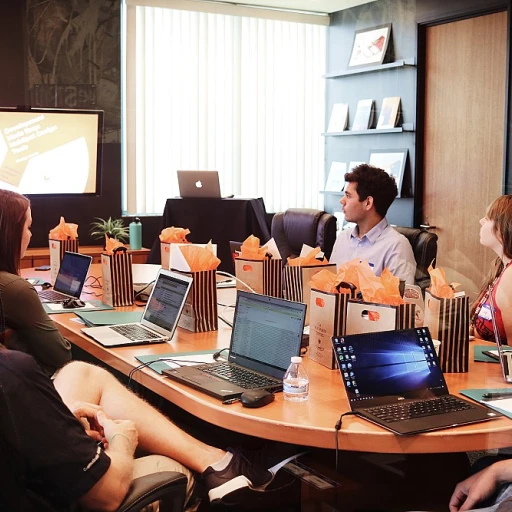
Understanding the Importance of Virtual Internships
The Increasing Demand for Virtual Internships
Virtual internships have become a crucial component in the professional development landscape. In today's evolving job market, they offer an accessible pathway for students and professionals to gain valuable work experience without the constraints of traditional internships. As the world continues to embrace remote work, companies are increasingly turning to virtual internships to connect with a broader pool of talent. Remote internships offer several benefits, both for interns and companies. They allow interns to engage with meaningful projects, develop problem-solving skills, and enhance their communication abilities—all from the comfort of their own environment. This flexibility often leads to a more personalized and successful virtual work experience. The emphasis on virtual settings has heightened the importance of developing communication and feedback mechanisms. Interns must adapt to new ways of learning and interacting, leveraging digital platforms to create productive work relationships. Meanwhile, companies benefit from the diverse perspectives that virtual interns bring, fostering innovation and creativity within teams. For those considering a virtual internship, understanding its scope and benefits can inform better decisions. Embracing virtual internships as part of a career strategy could pave the way for an enhanced internship experience, ultimately leading to fruitful career opportunities. For further insights on navigating career transitions and making the most of virtual internships, effective partnerships for transition can be explored.Key Features That Enhance Learning
Fostering an Effective Learning Environment for Interns
- Real-World Projects: Virtual internships should provide meaningful and relevant projects that mirror the tasks interns would encounter in traditional internships. These projects are integral to developing essential skills and gaining valuable work experience.
- Structured Mentorship Programs: A well-outlined mentorship structure can significantly enhance the learning process for remote interns. Effective guidance helps in navigating complex tasks and understanding the nuances of the job at hand.
- Comprehensive Feedback Mechanisms: Regular feedback is critical in remote internships, as it can guide interns towards professional development. Constructive criticism and praise can help interns refine their work and adopt new strategies to improve.
- Opportunities for Leadership Development: Encouraging virtual interns to take ownership of specific tasks can foster leadership skills. By empowering them to spearhead segments of their projects, companies instill confidence and promote problem-solving abilities.
- Access to Relevant Resources: Providing ample learning materials such as webinars, workshops, and online courses ensures interns are up to date with industry trends. Companies can enhance the career pathways for interns through effective partnerships for transition.
Virtual internships are designed to build career opportunities for students and enhance skills critical for remote work environments. This experiential learning is pivotal in preparing interns for successful virtual and traditional careers alike, equipping them with versatile competencies that benefit both the individual and the company.
effective partnerships for transitionTechnology and Tools in Virtual Internships
Embracing Technology and Tools to Maximise Effectiveness in Remote Internships
In the realm of virtual internships, technology emerges as both a pillar and a bridge connecting interns, mentors, and companies. As traditional internships give way to remote internships, harnessing the power of technology is a pivotal step towards creating a seamless work experience. One of the key advantages of remote work lies in the multitude of tools designed to facilitate effective communication and collaboration among virtual interns and their supervisors. Video conferencing platforms play an essential role in maintaining face-to-face interactions that cultivate meaningful connectivity. Scheduling regular virtual meetings ensures interns stay aligned with project goals and receive timely feedback. Even for those new to the concept, project management tools have become indispensable in tracking progress and enhancing productivity. These platforms allow virtual interns to organise tasks, assign priorities, and measure project outcomes, providing clear visibility into their contributions to the internship program. Moreover, immersive learning experiences flourish through innovative software and platforms that promote problem-solving and creativity in a virtual setting. For example, platforms offering simulated environments enable interns to practice new skills in a controlled, risk-free context. This type of learning cultivates confidence and encourages leadership development essential for career progression. The challenges posed by remote internships should not discourage companies or interns from embracing this transition. Instead, by deploying the right technological tools and establishing simple rules for their use, companies can develop effective internship programs that nurture the professional growth of interns. Thus, companies aiming for successful internship experiences should incorporate a strategic blend of technology with practical communication practices. Such integration promises to elevate the overall quality of the virtual internship, providing interns a robust platform to hone their skills and make impactful career strides.Networking Opportunities in a Virtual Setting
Building Connections in a Digital Workplace
In today's digital world, networking plays a pivotal role in career development, and virtual internships offer unique opportunities for interns to connect with professionals globally. Despite the lack of in-person interaction, remote internships provide several ways for students and interns to build valuable connections that can bolster their careers.
First, communication platforms used in virtual internships, like Slack or Microsoft Teams, allow interns to engage in regular discussions with their peers and supervisors. These tools facilitate not just work-related communication but also enable informal chats, helping interns build rapport with colleagues.
Moreover, many companies host virtual networking events and webinars, giving interns a chance to interact with industry experts and leaders. These events, which are usually designed to enhance interns’ learning and professional development, also allow for the exchange of ideas and experiences, deepening the understanding of industry dynamics.
Feedback sessions are another crucial element in virtual internships. Regular feedback from mentors can guide interns in honing their skills, improving project outcomes, and understanding company expectations better. These sessions serve as a platform for interns to demonstrate problem solving skills and seek career advice, aligning their experience with their professional goals.
Furthermore, many virtual internship programs encourage participation in collaborative projects. These group exercises not only enhance teamwork skills but also foster relationships among interns, often leading to long-term professional connections. In these setups, interns learn the tenets of both leadership development and working effectively in a remote team, skills crucial for today's work environment.
The simple rules of engaging actively, seeking feedback, and contributing to discussions throughout the remote internship can greatly benefit virtual interns in establishing a strong professional network. While traditional internships might offer different dynamics, the benefits of remote work settings in terms of expansive networking remain unmatched.
Evaluating the Quality of Virtual Internship Programs
Assessing the Value: Quality Marks of Virtual Internship Programs
Evaluating the quality of a virtual internship program is crucial for ensuring that the experience is both productive and enriching for students. Below are key aspects to consider that will help you gauge the effectiveness of the internship:
- Clear Objectives: A quality program should have well-defined goals for both the intern and the organization. Transparent expectations set a solid foundation and align with the overall aim of enhancing career skills and knowledge.
- Effective Communication Channels: Regular communication is vital in remote internships. Programs should offer robust communication tools, allowing interns to easily connect with supervisors and team members.
- Structured Feedback Mechanisms: Feedback is a pillar of the internship experience. Top programs provide structured opportunities for interns to receive constructive feedback, fostering professional development and problem solving abilities.
- Mentorship Opportunities: Access to mentors can significantly enhance the learning experience. Programs that assign mentors help bridge the gap between theoretical learning and practical application.
- Variety of Projects: A diverse range of projects enhances work experience. Quality programs offer varied project work that challenges interns and encourages leadership development through real-world applications.
- Integration into Company Culture: Virtual internships should provide opportunities to understand and integrate into the company culture. This can be facilitated through virtual networking events and team meetings.
By carefully evaluating these aspects, students can ensure they are selecting a virtual internship program that will equip them with valuable skills and experience, paving the way for a successful virtual work experience that mirrors traditional internships in terms of professional growth.













